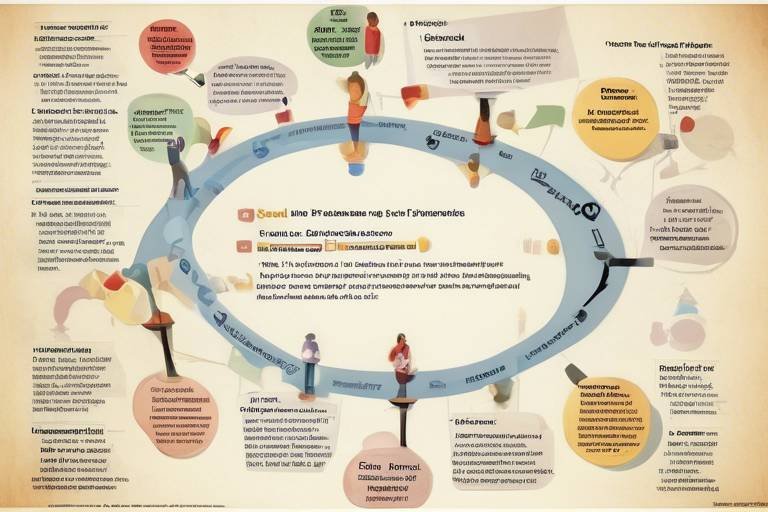Innovations in Market Research - Adapting to Consumer Behavior
In today's fast-paced world, understanding consumer behavior is more critical than ever for businesses aiming to thrive. With the advent of new technologies and shifting market dynamics, companies must adapt their market research strategies to keep pace with rapidly changing consumer preferences. This article delves into the latest innovations in market research, highlighting how businesses can leverage these advancements to gain deeper insights into their target audiences and respond effectively to their needs.
Technology has revolutionized market research, enabling faster data collection and analysis. Tools like artificial intelligence (AI) and big data have become indispensable in enhancing insights into consumer behavior. For instance, AI algorithms can analyze vast amounts of data to identify patterns and trends that would be impossible for humans to detect. This not only speeds up the research process but also increases the accuracy of the insights gained. Imagine having a virtual assistant that can sift through mountains of consumer data in seconds, providing you with actionable insights that can drive your marketing strategies. That's the power of technology in market research.
Understanding current consumer behavior trends is crucial for businesses looking to stay ahead of the competition. With the market continuously evolving, companies must keep a pulse on the factors influencing purchasing decisions. Some key trends include:
- Increased focus on sustainability: Consumers are becoming more environmentally conscious, making eco-friendly products more appealing.
- Demand for convenience: The desire for quick and easy shopping experiences is shaping how businesses approach their offerings.
- Influence of peer reviews: Today’s consumers often rely on reviews and recommendations from their peers more than traditional advertising.
By leveraging these trends, companies can tailor their marketing strategies to resonate with their target audiences, ultimately driving sales and customer loyalty.
The rise of e-commerce has dramatically shifted consumer shopping habits. More people are turning to online platforms for their shopping needs, which has transformed market research methodologies and strategies. For example, businesses now utilize online surveys and feedback forms to gather real-time data from consumers. This shift allows companies to be more agile in their marketing efforts, adjusting their strategies based on immediate consumer feedback.
Social media platforms play a significant role in shaping consumer preferences. With billions of users worldwide, platforms such as Facebook, Instagram, and Twitter provide a treasure trove of consumer insights. Businesses can analyze social media trends to understand what resonates with their audience, allowing them to craft targeted marketing campaigns. For example, by monitoring trending hashtags or popular posts, companies can identify potential opportunities for engagement and product promotion.
Personalization has emerged as a key factor in consumer satisfaction. Today's consumers expect brands to understand their preferences and tailor offerings accordingly. Market research can identify opportunities for personalized marketing strategies that resonate with target audiences. For instance, using data analytics, businesses can segment their audience based on purchasing behavior, enabling them to send personalized recommendations and offers that increase the likelihood of conversion.
Innovative methodologies are transforming how market research is conducted. Techniques such as mobile surveys and ethnographic studies provide deeper consumer insights. Mobile surveys, for example, allow businesses to reach consumers directly on their devices, increasing response rates and engagement. Ethnographic studies, on the other hand, involve observing consumers in their natural environments, offering a more authentic understanding of their behaviors and motivations.
As market research evolves, data privacy concerns become increasingly important. Businesses must navigate a complex landscape of regulations and ethical considerations while collecting consumer data. Transparency in data collection practices is essential for maintaining consumer trust. Companies that prioritize ethical practices not only comply with regulations but also build stronger relationships with their customers.
Understanding the regulatory landscape is essential for ethical market research. Key regulations such as the General Data Protection Regulation (GDPR) and the California Consumer Privacy Act (CCPA) impose strict guidelines on how businesses can collect and use consumer data. Companies must stay informed about these regulations to ensure compliance and avoid potential penalties.
Trust is vital for successful market research. Companies can build consumer trust by being transparent about their data collection practices and ensuring that consumer information is handled responsibly. Implementing clear privacy policies and providing consumers with the option to opt-out of data collection can go a long way in fostering trust. Remember, a trustworthy brand is more likely to gain loyal customers.
- What are the latest trends in market research?
Some of the latest trends include the use of AI for data analysis, increased focus on sustainability, and the demand for personalized marketing strategies.
- How can technology improve market research?
Technology can enhance market research by enabling faster data collection, providing real-time insights, and allowing for more accurate analysis through tools like big data and AI.
- What are the ethical considerations in market research?
Ethical considerations include ensuring data privacy, complying with regulations, and maintaining transparency in data collection practices.

The Role of Technology in Market Research
In today's fast-paced world, technology has become the backbone of effective market research. Gone are the days when businesses relied solely on traditional methods like surveys and focus groups. Now, with the advent of artificial intelligence (AI) and big data analytics, companies can gather and analyze vast amounts of information in real-time. This transformation allows for a deeper understanding of consumer behavior, preferences, and trends.
Let's dive deeper into how these technological advancements are reshaping market research. For instance, AI can process data at lightning speed, identifying patterns that would take humans much longer to discern. Imagine having a virtual assistant that can sift through thousands of consumer reviews, social media posts, and purchase histories to uncover insights about what drives your customers. This level of analysis not only saves time but also provides businesses with a competitive edge.
Moreover, big data enables companies to collect information from various sources, including online transactions, social media interactions, and even browsing behaviors. This wealth of data can be structured into actionable insights. For example, companies can segment their audience based on demographic information, purchase history, and even psychographic data, allowing for highly targeted marketing strategies. The result? Businesses can tailor their offerings to meet the specific needs of different consumer groups.
Another exciting development is the use of mobile technology in market research. With the rise of smartphones, companies can now conduct surveys and gather feedback through apps, making it easier for consumers to participate. This not only increases response rates but also allows businesses to reach a broader audience. Imagine being able to get instant feedback on a new product while customers are still in the store! This immediacy can significantly enhance the decision-making process.
Additionally, the integration of social listening tools has become crucial in understanding consumer sentiment. By monitoring social media platforms, businesses can gain insights into how their brand is perceived and identify emerging trends. For example, if a particular hashtag related to your product starts trending, it could indicate a shift in consumer interest that you can capitalize on. This proactive approach to market research ensures that businesses remain relevant and responsive to their audience's needs.
However, while technology offers numerous benefits, it also brings challenges, particularly concerning data privacy. As companies collect more data, they must be vigilant about protecting consumer information and complying with regulations. Balancing the need for insights with ethical considerations is paramount. Therefore, businesses must invest not only in technology but also in training their teams on best practices for data handling.
In conclusion, technology plays a pivotal role in modern market research by enhancing data collection and analysis processes. As businesses continue to adapt to technological advancements, the ability to understand and respond to consumer behavior will define their success in an increasingly competitive landscape. Embracing these innovations is not just an option; it’s a necessity for businesses that want to thrive.
- How does AI improve market research? AI enhances market research by processing large datasets quickly, identifying patterns, and providing actionable insights that would take humans much longer to discover.
- What is big data, and why is it important? Big data refers to the vast amounts of data generated from various sources. It's important because it allows businesses to analyze consumer behavior on a granular level, leading to more informed decision-making.
- How can mobile technology be used in market research? Mobile technology facilitates surveys and feedback collection through apps, increasing participation rates and providing real-time insights from consumers.
- What are social listening tools? Social listening tools monitor social media platforms to understand consumer sentiment and emerging trends, helping businesses stay ahead of market shifts.
- What ethical considerations should businesses keep in mind? Businesses must prioritize data privacy and comply with regulations while collecting consumer data, ensuring transparency and building trust with their audience.

Consumer Behavior Trends
Understanding current consumer behavior trends is crucial for businesses aiming to stay ahead in a competitive landscape. In today's fast-paced market, consumers are not just passive recipients of marketing messages; they actively shape their purchasing experiences. This shift in dynamics means that businesses must continually adapt to the evolving preferences and behaviors of their target audiences. With the advent of technology and changing societal norms, several key trends are influencing how consumers make decisions.
One of the most significant trends is the increasing demand for transparency. Today's consumers are more informed than ever, thanks to the internet and social media. They want to know where their products come from, how they are made, and the ethical implications of their purchases. This demand for transparency is compelling brands to be open about their sourcing, manufacturing processes, and corporate social responsibility initiatives. As a result, businesses that prioritize transparency can foster stronger relationships with their customers, leading to increased loyalty and brand advocacy.
Another trend reshaping consumer behavior is the growing importance of sustainability. Consumers are increasingly gravitating towards brands that demonstrate a commitment to environmental stewardship. They are not just looking for products that meet their needs; they are also considering the impact of their purchases on the planet. This shift has led to a rise in eco-friendly products and sustainable practices across various industries. Companies that leverage sustainability in their marketing strategies can differentiate themselves in a crowded marketplace.
Furthermore, the rise of digital platforms has transformed how consumers shop. With the explosion of e-commerce, traditional brick-and-mortar stores are facing stiff competition. Consumers now enjoy the convenience of shopping from anywhere, at any time. This shift has led to changes in purchasing habits, with many consumers opting for online shopping over in-person experiences. Businesses need to adapt their market research methodologies to understand this new shopping behavior, employing tools such as analytics and user experience testing to enhance their online presence.
Additionally, the impact of social media on consumer choices cannot be overstated. Platforms like Instagram, Facebook, and TikTok have become powerful tools for influencing purchasing decisions. Consumers often turn to social media for product recommendations, reviews, and inspiration. Brands that effectively engage with their audience on these platforms can gain valuable insights into consumer preferences and trends. By analyzing social media interactions and feedback, businesses can refine their marketing strategies and better align their offerings with consumer desires.
Lastly, the importance of personalization in marketing has skyrocketed. Consumers are increasingly expecting tailored experiences that resonate with their individual preferences. This trend highlights the need for businesses to leverage data analytics to understand their customers better. By utilizing market research to identify specific consumer segments and their unique behaviors, companies can create personalized marketing strategies that enhance customer satisfaction and drive sales. In a world where consumers are bombarded with generic advertising, personalization stands out as a critical factor in capturing attention and fostering loyalty.
In summary, staying attuned to these consumer behavior trends is essential for businesses looking to thrive in an ever-changing market. By embracing transparency, sustainability, digital shopping habits, social media influence, and personalization, companies can not only meet consumer expectations but also create meaningful connections that lead to long-term success.
- What are the key trends in consumer behavior today?
Key trends include a demand for transparency, sustainability, the rise of e-commerce, the influence of social media, and personalization in marketing. - How can businesses adapt to changing consumer behavior?
Businesses can adapt by leveraging data analytics, engaging with consumers on social media, and implementing sustainable practices. - Why is personalization important in marketing?
Personalization enhances customer satisfaction and fosters loyalty by providing tailored experiences that resonate with individual preferences.

Shifts in Online Shopping Habits
The digital landscape has undergone a seismic shift in recent years, fundamentally altering how consumers approach shopping. Gone are the days when brick-and-mortar stores dominated the retail scene; now, online shopping is the new norm. This transformation isn't just a passing trend; it's a reflection of changing consumer preferences and technological advancements that have made shopping more accessible and convenient than ever before.
One of the most significant shifts in online shopping habits is the increasing reliance on mobile devices. Consumers are no longer tethered to their desktops; they are browsing and purchasing products directly from their smartphones and tablets. According to recent studies, over 70% of online shoppers now use their mobile devices for purchases, indicating a clear shift towards mobile commerce. This trend is reshaping how businesses approach their marketing strategies, emphasizing the need for mobile-friendly websites and apps.
Additionally, the rise of social commerce has transformed how brands engage with consumers. Platforms like Instagram and Facebook have integrated shopping features that allow users to browse products directly within their feeds. This seamless integration not only enhances the shopping experience but also fosters a sense of community among consumers. With just a few taps, shoppers can discover new products, read reviews, and make purchases without leaving their favorite social media platforms.
Moreover, the pandemic has accelerated the shift towards online shopping, with many consumers who were once hesitant to shop online now embracing it as their primary shopping method. This behavioral change has prompted businesses to rethink their market research strategies. Understanding how these shifts affect consumer purchasing decisions is crucial for staying competitive. For instance, online retailers must now prioritize user experience and customer service to retain their customers in a crowded marketplace.
To illustrate the impact of these shifts, consider the following table that highlights key changes in consumer behavior:
| Shift | Description | Implications for Businesses |
|---|---|---|
| Mobile Shopping | Increased use of smartphones for online purchases | Need for mobile-optimized websites and apps |
| Social Commerce | Shopping directly through social media platforms | Enhanced engagement through social media marketing |
| Increased Online Presence | Consumers prefer online shopping over traditional methods | Focus on e-commerce strategies and digital marketing |
In conclusion, the shifts in online shopping habits are not just trends; they represent a fundamental change in how consumers interact with brands. For businesses, adapting to these changes means prioritizing mobile accessibility, leveraging social media for commerce, and continuously gathering insights through market research. By staying attuned to these shifts, companies can better meet the evolving needs of their customers and thrive in a competitive landscape.
- What are the main factors driving the shift to online shopping? The main factors include convenience, the rise of mobile devices, and the integration of shopping features in social media platforms.
- How can businesses adapt to changing online shopping habits? Businesses can adapt by optimizing their websites for mobile use, engaging with consumers on social media, and focusing on enhancing the overall user experience.
- What role does data play in understanding consumer behavior? Data provides valuable insights into purchasing patterns, preferences, and trends, allowing businesses to tailor their strategies accordingly.

Impact of Social Media on Consumer Choices
In today's digital age, social media has become a powerful force that shapes consumer choices in ways we never imagined. Think about it: when was the last time you made a purchase without scrolling through social media for reviews or recommendations? Social media platforms like Instagram, Facebook, and TikTok have transformed the traditional marketing landscape, giving consumers a voice and a platform to influence others. This dynamic shift means that businesses must pay close attention to their online presence and how they engage with their audience.
One of the most significant impacts of social media on consumer choices is the rise of influencer marketing. Influencers, with their dedicated followings, have the ability to sway opinions and drive purchasing decisions. When an influencer endorses a product, it’s not just a recommendation; it’s a powerful testament that resonates with their followers. This has resulted in consumers trusting these endorsements more than traditional advertisements. In fact, studies show that 70% of teenagers trust influencers more than traditional celebrities. This statistic highlights the importance of aligning marketing strategies with social media trends to reach the right audience effectively.
Moreover, social media platforms are not just venues for advertising; they are also interactive spaces where consumers can engage with brands directly. This engagement fosters a sense of community and loyalty. Brands that actively respond to comments, share user-generated content, and create interactive posts often see higher levels of customer satisfaction and retention. It's all about establishing a two-way communication channel that makes consumers feel valued and heard.
Additionally, social media serves as a real-time feedback loop. Consumers can share their experiences immediately, and businesses can adjust their strategies accordingly. For instance, if a product receives negative feedback on social media, companies can quickly address the issue, whether by improving the product or enhancing customer service. This responsiveness not only mitigates potential damage but also shows consumers that their opinions matter, further building trust.
To illustrate the impact of social media on consumer choices, consider the following table that summarizes key statistics:
| Statistic | Impact |
|---|---|
| 70% of teenagers trust influencers over celebrities | Influencer marketing is crucial for targeting younger demographics |
| 54% of social media users browse products on platforms | Social media is a primary shopping tool |
| 90% of consumers read online reviews before making a purchase | Social proof influences buying decisions significantly |
In conclusion, the impact of social media on consumer choices is profound and multifaceted. Businesses that leverage social media effectively can tap into a wealth of insights, build stronger relationships with their audience, and ultimately drive sales. As we continue to navigate this digital landscape, understanding the nuances of social media's influence will be key to staying ahead of the competition.
- How does social media influence purchasing decisions? Social media influences purchasing decisions by providing platforms for reviews, recommendations, and influencer endorsements, which consumers often trust more than traditional advertising.
- What role do influencers play in consumer choices? Influencers play a significant role as they can sway their followers' opinions and purchasing decisions through their endorsements and authentic engagement.
- How can businesses utilize social media for market research? Businesses can utilize social media for market research by analyzing consumer feedback, engagement metrics, and trends to understand preferences and improve their offerings.
- What are the benefits of engaging with consumers on social media? Engaging with consumers on social media builds trust, fosters community, and allows businesses to receive real-time feedback, helping to enhance customer satisfaction and loyalty.

Importance of Personalization
In today's competitive market, personalization has emerged as a critical strategy for businesses aiming to capture the attention of consumers. Imagine walking into a store where every product is tailored to your taste—sounds appealing, right? This is the essence of personalization, and it extends far beyond mere product recommendations. It's about creating a unique experience that resonates with each individual customer.
Research shows that consumers are more likely to engage with brands that understand their preferences and cater to their needs. In fact, a recent study found that 80% of consumers are more inclined to purchase from a brand that offers personalized experiences. This highlights the importance of leveraging market research to identify specific consumer behaviors and preferences. By understanding what makes your audience tick, you can craft messages that feel less like marketing and more like a conversation with a friend.
Furthermore, personalization can significantly enhance customer loyalty. When consumers feel valued and understood, they are more likely to return for repeat purchases. This loyalty is not just about buying a product; it's about forming a connection. Brands that invest in personalization strategies can expect to see not only an increase in sales but also a stronger emotional bond with their customers. Think of personalization as the secret sauce that transforms a one-time buyer into a lifelong advocate for your brand.
To effectively implement personalization, businesses must utilize various market research techniques. Here are some methods that can help:
- Data Analysis: Analyze customer data to uncover trends and preferences.
- Segmentation: Divide your audience into segments based on behavior and preferences.
- Feedback Loops: Use surveys and customer feedback to refine your personalization efforts.
In conclusion, the importance of personalization in market research cannot be overstated. As consumers become increasingly savvy and discerning, brands that take the time to understand and cater to their individual needs will not only thrive but also create lasting relationships. So, if you haven't yet embraced personalization, now is the time to start exploring how it can revolutionize your marketing strategy.
- What is personalization in marketing? Personalization in marketing refers to the practice of tailoring messages, offers, and experiences to individual consumers based on their preferences and behaviors.
- Why is personalization important? Personalization is important because it enhances customer engagement, increases loyalty, and improves the overall customer experience, leading to higher conversion rates.
- How can businesses implement personalization? Businesses can implement personalization by analyzing customer data, segmenting their audience, and utilizing feedback to create tailored marketing strategies.

Emerging Research Methodologies
In the fast-paced world of market research, traditional methods are increasingly being supplemented—or even replaced—by that leverage new technologies and innovative approaches. These methodologies are not just a passing trend; they are reshaping how businesses gather insights about their consumers. With the rise of mobile technology and the increasing importance of real-time data, companies are now able to engage with consumers in ways that were previously unimaginable.
One of the most significant shifts we’re witnessing is the adoption of mobile surveys. Unlike traditional surveys that may require lengthy questionnaires filled out at inconvenient times, mobile surveys allow businesses to reach consumers directly on their smartphones, making it easier for participants to respond in real-time. This immediacy not only increases response rates but also provides businesses with more accurate data reflecting current consumer sentiments. Imagine being able to ask your customers about their experience right after they’ve made a purchase—this is the power of mobile surveys.
Another exciting development is the use of ethnographic studies. This methodology involves observing consumers in their natural environment, allowing researchers to gain deeper insights into their behaviors and motivations. Instead of relying solely on what consumers say they do, ethnographic studies reveal what they actually do. This approach can be particularly beneficial for understanding complex purchasing decisions, as it captures the subtleties of consumer interactions with products and brands in real-world settings.
Moreover, the integration of big data analytics into market research is transforming the landscape. By analyzing vast amounts of data from various sources—such as social media, online shopping behaviors, and customer feedback—businesses can identify patterns and trends that were previously hidden. This data-driven approach enables companies to make more informed decisions, tailor their marketing strategies, and ultimately enhance customer satisfaction. For instance, a retailer might discover that a specific demographic is increasingly purchasing eco-friendly products, prompting them to adjust their inventory and marketing strategies accordingly.
As we look at these emerging methodologies, it's essential to recognize that they are not mutually exclusive. In fact, the most effective market research strategies often involve a combination of different methods. For instance, a company might use mobile surveys to gather immediate feedback on a new product while simultaneously conducting ethnographic studies to understand the broader context of consumer behavior. This multifaceted approach allows businesses to develop a more comprehensive understanding of their target audience.
In conclusion, the landscape of market research is evolving rapidly, and companies that embrace these emerging methodologies will find themselves better equipped to adapt to changing consumer behaviors. By leveraging mobile surveys, ethnographic studies, and big data analytics, businesses can gain deeper insights into their customers, leading to more effective marketing strategies and improved consumer satisfaction. The future of market research is not just about collecting data; it’s about understanding the stories behind that data.
- What are mobile surveys? Mobile surveys are questionnaires designed to be completed on smartphones, allowing for real-time feedback from consumers.
- What is ethnographic research? Ethnographic research involves observing consumers in their natural environments to gain insights into their behaviors and motivations.
- How does big data impact market research? Big data analytics allows businesses to analyze vast amounts of consumer data to identify trends and make informed decisions.
- Can multiple research methodologies be used together? Yes, combining different methodologies often leads to more comprehensive insights into consumer behavior.

Data Privacy and Ethical Considerations
In today’s digital age, data privacy has become a hot-button issue that every business must navigate with care. As companies collect vast amounts of consumer data to inform their market research, the ethical implications of this practice cannot be overlooked. It’s not just about gathering information; it’s about how that information is used and the trust that is built (or broken) in the process. With consumers becoming more aware of their data rights, businesses must prioritize transparency and ethical considerations in their research methodologies.
One of the primary concerns surrounding data privacy is the potential for misuse of personal information. Consumers are increasingly wary of how their data is collected, stored, and shared. This skepticism can lead to a significant loss of trust if businesses fail to communicate their data handling practices effectively. To mitigate these concerns, companies should adopt a proactive approach by implementing robust data privacy policies that comply with relevant regulations.
For instance, regulations such as the General Data Protection Regulation (GDPR) in Europe and the California Consumer Privacy Act (CCPA) in the United States set stringent guidelines regarding consumer data collection and usage. Understanding these regulatory frameworks is essential for businesses to ensure they are not only compliant but also ethical in their data practices. Here’s a brief overview of some key regulations:
| Regulation | Region | Key Focus |
|---|---|---|
| GDPR | Europe | Protection of personal data and privacy |
| CCPA | California, USA | Consumer rights regarding personal information |
| HIPAA | USA | Protection of health information |
Building consumer trust is another critical aspect of ethical market research. Businesses can achieve this by being transparent about their data collection methods and providing consumers with clear options to opt-in or opt-out of data sharing. When consumers feel that their privacy is respected, they are more likely to engage positively with brands. Additionally, implementing data anonymization techniques can further enhance consumer trust by ensuring that individual identities are protected during the research process.
Moreover, companies should strive to educate their consumers about the benefits of data collection. By communicating how their data will be used to enhance products and services, businesses can foster a sense of collaboration rather than exploitation. This approach not only improves consumer perception but also strengthens brand loyalty in the long run.
In conclusion, as the landscape of market research continues to evolve, data privacy and ethical considerations will remain at the forefront. Businesses that prioritize transparency, compliance, and consumer trust will not only navigate the complexities of data collection more effectively but will also position themselves as leaders in ethical market research.
- Why is data privacy important in market research?
Data privacy is crucial because it helps protect consumer information, builds trust, and ensures compliance with legal regulations. - What are some common data privacy regulations?
Common regulations include GDPR, CCPA, and HIPAA, each focusing on different aspects of data protection. - How can businesses build consumer trust in their data practices?
Businesses can build trust by being transparent about data usage, providing opt-in options, and educating consumers on the benefits of data collection.

Regulatory Frameworks
In the fast-paced world of market research, understanding is not just important; it's essential. As businesses increasingly rely on consumer data to drive their strategies, they must navigate a complex web of laws and regulations designed to protect consumer privacy. These frameworks vary significantly across different regions and countries, creating a challenging environment for companies operating on a global scale. For instance, the General Data Protection Regulation (GDPR) in the European Union sets stringent guidelines for data collection and usage, while in the United States, regulations can differ from state to state, leading to a patchwork of compliance requirements.
To illustrate how these regulations can impact market research, consider the following key aspects:
- Consent: Obtaining explicit consent from consumers before collecting their data is a fundamental requirement under many regulatory frameworks. This means businesses must ensure that their data collection practices are transparent and that consumers are fully informed about how their data will be used.
- Data Minimization: Regulations often emphasize the principle of data minimization, which means companies should only collect data that is necessary for their research objectives. This not only helps in compliance but also builds consumer trust.
- Right to Access: Many frameworks grant consumers the right to access their data and request corrections. This means businesses must have processes in place to manage these requests efficiently.
Moreover, the consequences of non-compliance can be severe. Companies found violating these regulations may face hefty fines, legal actions, and damage to their reputation. Therefore, it’s crucial for businesses to stay informed about the latest regulatory changes and invest in compliance training for their teams. They must also consider implementing robust data governance policies that not only comply with the law but also foster a culture of ethical data use within the organization.
In summary, as market research evolves, understanding and adhering to regulatory frameworks is paramount. Companies that prioritize compliance will not only mitigate risks but also enhance their credibility and build stronger relationships with their consumers. As we move forward, the landscape of regulations will likely continue to evolve, making it imperative for businesses to stay agile and informed.
- What are the key regulations affecting market research?
Key regulations include GDPR in the EU, CCPA in California, and various other state-level privacy laws in the U.S. - How can businesses ensure compliance with data privacy laws?
Businesses can ensure compliance by staying updated on regulations, obtaining explicit consent, and implementing data governance policies. - What are the consequences of non-compliance?
Consequences include fines, legal penalties, and damage to brand reputation.

Building Consumer Trust
In today's fast-paced digital world, is not just an option; it's a necessity. With countless brands vying for attention, consumers are more cautious than ever about who they choose to engage with. They want to feel secure, valued, and understood. So, how can businesses foster this crucial trust? It all starts with transparency. When companies are open about their practices, from data collection to product sourcing, it creates a foundation of honesty that consumers appreciate.
Moreover, trust is built through consistent communication. Brands that maintain a dialogue with their audience—whether through social media, newsletters, or customer service—show that they care about their customers' opinions and experiences. This interaction not only humanizes the brand but also encourages loyalty. Think of it like a friendship; the more you communicate, the stronger the bond becomes.
Another significant factor in building trust is data privacy. In an age where information is power, consumers are understandably concerned about how their data is used. Businesses need to prioritize ethical data collection practices and ensure that customers are informed about how their information will be utilized. This means not just adhering to regulations but going above and beyond to protect consumer data. A recent survey revealed that 79% of consumers are more likely to trust brands that are transparent about their data practices.
| Trust-Building Strategies | Impact on Consumers |
|---|---|
| Transparent Data Practices | Increases consumer confidence |
| Consistent Communication | Enhances brand loyalty |
| Personalized Experiences | Improves customer satisfaction |
| Responsive Customer Service | Builds a positive brand image |
Additionally, offering personalized experiences can significantly enhance trust. When consumers feel that a brand understands their unique needs and preferences, it fosters a sense of belonging. This could be as simple as personalized recommendations based on previous purchases or tailored content in marketing emails. The key is to make consumers feel special and valued.
Finally, responsive customer service is vital in trust-building. When customers reach out with questions or concerns, they expect prompt and helpful responses. A brand that listens and acts on feedback not only resolves issues but also shows that it values its customers’ opinions. This responsiveness can turn a negative experience into a positive one, ultimately solidifying trust.
In conclusion, building consumer trust is a multifaceted endeavor that requires a commitment to transparency, communication, data privacy, personalization, and responsive service. By prioritizing these elements, businesses can cultivate a loyal customer base that feels secure and valued, paving the way for long-term success.
- Why is consumer trust important?
Consumer trust is vital as it leads to customer loyalty, repeat purchases, and positive word-of-mouth, all of which are essential for a brand's growth. - How can a brand increase transparency?
Brands can increase transparency by openly sharing their data practices, sourcing information, and being honest about product ingredients and processes. - What role does customer service play in building trust?
Responsive and helpful customer service shows consumers that a brand values their concerns, which can significantly enhance trust and loyalty.
Frequently Asked Questions
- What is the role of technology in market research?
Technology plays a transformative role in market research by enabling faster and more efficient data collection and analysis. Tools like artificial intelligence (AI) and big data analytics provide businesses with deeper insights into consumer behavior, allowing them to adapt quickly to market changes and consumer preferences.
- How have consumer behavior trends changed recently?
Recent consumer behavior trends show a significant shift towards online shopping, influenced by convenience and accessibility. Understanding these trends helps businesses tailor their strategies to meet consumer needs, ensuring they remain competitive in a fast-paced market.
- What impact does social media have on consumer choices?
Social media has become a powerful tool in shaping consumer preferences. Businesses can analyze social media insights to understand trends and sentiments, guiding their marketing strategies and helping them connect more effectively with their target audience.
- Why is personalization important in market research?
Personalization is crucial for enhancing consumer satisfaction. By leveraging market research to identify opportunities for personalized marketing, businesses can create tailored experiences that resonate with their audiences, ultimately driving engagement and loyalty.
- What are some emerging methodologies in market research?
Emerging methodologies such as mobile surveys and ethnographic studies are revolutionizing market research. These techniques provide businesses with richer, more nuanced insights into consumer behavior, allowing for more informed decision-making and strategy development.
- What are the ethical considerations in market research?
As market research evolves, ethical considerations, particularly regarding data privacy, become paramount. Businesses must navigate the regulatory landscape to ensure they collect and use consumer data responsibly, maintaining trust and transparency throughout the research process.
- How can businesses build consumer trust in data collection?
Building consumer trust involves being transparent about data collection practices and ensuring that consumers understand how their data will be used. Implementing clear privacy policies and actively communicating with consumers can foster trust and encourage participation in research initiatives.



















